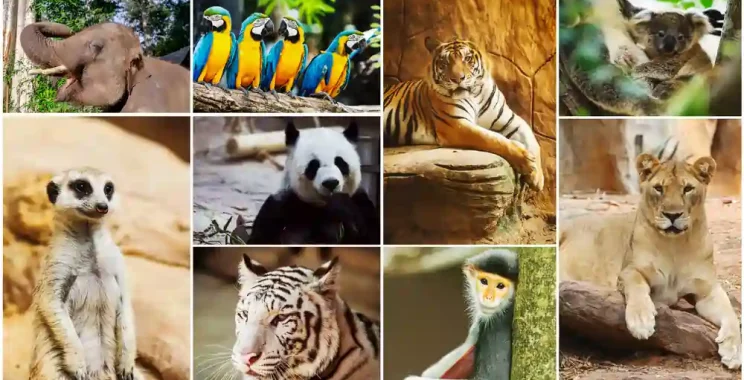How Do Different Animals Sleep?
Share
Fact checked
Reviewed by experts
Updated
January 9, 2023
Quick read
5 mins to read
List of Content
Did you know? Walruses remain active for up to 84 hours.
While all animals need sleep, just like humans, how they sleep differs from one species to another. Many animals either sleep too little or too much. But sleep is a common link among all living beings. In fact, even the one-celled organisms display evidence of circadian rhythm. So, without further ado, let’s unpack everything you must know about animals and sleep.
Why Do Animals Sleep?
According to researchers, sleep is a vital evolutionary function. In both humans and animals, sleep is crucial for overall well-being. Insufficient sleep can lead to reduced cognitive function, lower immunity, and more. For some animals, sleep becomes necessary to keep them active during their waking hours to keep dangers or predators away.
When animals are asleep, the brain activity reduces, and the neurons go slowly in a coordinated pattern. However, during the REM stage, the neuron movement becomes rapid, as it can be due to a vivid dream.
Hibernation Vs Sleep
You must have heard how some animals hibernate. It is a way of life for some animals to survive the harsh weather and save their energy levels. From chipmunks to bats, several animals hibernate. The hibernation period can last for months.
While hibernation seems like an extended state of sleep, it isn’t. It is a state of torpor. During this state, animals experience low metabolism, heart rate, body temperature, and respiration. This is similar to what happens during the sleep cycle, but more enhanced. That said, bears hibernate uniquely. Even in torpor, a bear’s body temperature remains almost the same. But for up to seven months, during their hibernation, bears don’t urinate, defecate or eat much.
Carnivores vs. Herbivores: Sleep Patterns
When we look at animal sleep patterns, they tend to vary from one species to another. However, the reason for this is said to be fear of predators. Typically, it is seen that carnivores tend to sleep more than herbivorous ones. One reason for this is that they tend to save energy to hunt for food the next day.
Also, sleep is connected to the food they consume. Animals who eat calorie-dense food tend to sleep more than those who consume fewer calories. Herbivores are also awake for long durations as they need to graze enough to supply them with the necessary energy. Some animals, such as giraffes and elephants, only sleep for 30 minutes to a few hours daily.
If you are wondering which animal stands and sleeps, the answer is horses, zebras, and elephants. And, which animal opens its eyes and sleeps? Well, whales and dolphins can sleep with their eyes open!
Why Animals Sleep Differently
How an animal sleeps and how much different animals sleep depends on their size, diet, and other psychological factors. However, in most cases, small animals sleep more than large animals. Let’s look at all the factors that play a role in sleep.
Sleep and Metabolism
When it comes to metabolism, small animals have faster metabolism compared to larger animals. It is seen that the brains of animals with faster metabolism contain more neurons and the brains of larger animals contain less dense neurons. Now, how small animals sleep depends on their brains, as that’s when it flushes out waste by-products known as metabolites. And this waste leads to them falling asleep faster. In contrast, larger animals generate less waste.
Body Size & diet
It is also seen that larger animals need more food as their muscle mass is high. That said, large herbivore animals don’t sleep for long durations as it takes them longer to graze and eat when compared to large carnivores. Also, large animals move slower than small animals, reducing their need to sleep.
Sleep and immunity
Sleep is essential to boost immunity. Therefore, animals exposed to pathogens sleep for several blocks to ensure energy is transferred to their immune system. In fact, one study with rabbits shows us that sleeping for long periods after an infection accelerated their recovery.
Animal Sleep Behaviors
If you are wondering how different animals sleep, let’s look at the various sleep behaviors.
Diurnal: These animals are active during the day and sleep at night like most humans.
Nocturnal: Nocturnal animals eat and remain active at night, such as bats and raccoons.
Crepuscular: They are primarily active during dawn, dusk, cloudy days and bright nights.
Metaturnal: Also known as cathemeral, they keep changing their sleep behavior by sporadic activity. For instance, lemurs go from diurnal to nocturnal as per the seasons.
How Mammals Sleep
Mammals are vertebrate animals with mammary glands that nurse and feed their young ones. Let’s take a look at how mammals sleep!
Land Mammals
Generally, land mammals sleep similarly to humans, dividing sleep into light, deep, and REM sleep. However, mammals like armadillos sleep for almost 18 hours a day, while horses sleep for less than four hours.
Marine Mammals
As the name suggests, marine mammals live in water, and to ensure they don’t suffocate during sleep, they experience unihemispheric sleep. Here, one brain hemisphere is awake while the other is asleep. However, if you take dolphins, for example, they float on top of the water and are known as logging off. Sperm whales tend to sleep upright and do not have a unihemispheric sleep.
How Do Birds Sleep
Just like marine mammals, some birds sleep with one brain hemisphere, especially during migration, which can last for about 200 days. Here, they tend to fly non-stop. Some birds, such as frigate birds, stayed awake and alert during the day, but at night during their flight, they experienced slow-wave sleep that lasted several minutes. Some birds also take power naps, and some sleep in groups. For instance, ducks sleep in a row where the middle one closes both eyes but the ducks at the end have one eye open, indicating unihemispheric sleep.
How Do Reptiles and Amphibians Sleep
How Do Fish Sleep
When asleep fish remain motionless and hover at the bottom of the sea. To keep themselves steady, they flinch their fins. However, their sleep patterns depend on their environment and activity levels.
Conclusion
Now you know how animals sleep. All animals, even insects, tend to sleep. While it can be different from how we sleep. And evolution requires all animals to sleep to survive and be well.
FAQs
The animal that’s associated with sleep can be Koala Bears as they sleep the most for 20 to 22 hours in a day.
Horses and elephants can sleep standing up.
As aforementioned, sleep is essential for survival and overall well-being.
All animals need some sleep, which might not be like humans.
Not all animals sleep at night. The same is explained in the above article. Take a look.
Crocodiles sleep with one eye open and go through unihemispheric sleep.
This website does not offer medical advice nor professional medical services; rather, it is provided solely for educational, informational, and/or entertainment purposes. Individuals seeking medical advice should consult a licensed physician. The information provided should not be used for diagnosis or treatment of any condition, disease, or injury. When you have a medical condition, you should always talk to licensed doctor or other certified medical professional. You should never delay seeking professional medical advice or treatment based on the contents of this website. Call 911 or immediately go to the nearest emergency room if you think you may have a medical emergency. The contents of this website are provided “as-is”, Sleep Authority and its parent, subsidiaries, affiliates, employees, contributors disclaim any warranty of the information contained herein. Please contact using contact form to report any errors, omissions, misinformation, or abuse.
Sleep Authority is brought to you by Resident, the company that brings you Nectar, DreamCloud, Awara, Wovenly, Bundle, Home Well Designed and Level Sleep.



